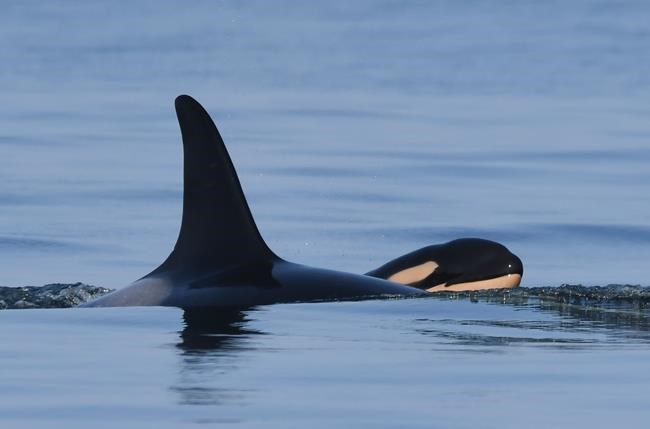
The orca mother that sparked international headlines by carrying her dead calf for 17 days in waters off the Pacific Northwest coast in 2018 has given birth again. The Centre for Whale Research says a new calf was spotted on Saturday with a pod of endangered southern resident killer whales and the mother has been identified as J35, or Tahlequah, shown in a handout photo. THE CANADIAN PRESS/HO/Katie Jones, Center for Whale Research MANDATORY CREDIT
September 06, 2020 - 3:27 PM
FRIDAY HARBOR, Wash. - The orca mother that sparked international headlines by carrying her dead calf for more than two weeks off the Pacific Northwest coast in 2018 has given birth again.
The Centre for Whale Research says a new calf was spotted on Saturday with a pod of endangered southern resident killer whales and the mother has been identified as J35, or Tahlequah.
The centre based in Washington state says the new calf appeared "healthy and precocious, swimming vigorously alongside its mother in its second day of free-swimming life."
It estimates the calf was born on Sept. 4, since its dorsal fin was upright and the fin takes a day or two to straighten after being bent inside the womb and Tahlequah had not yet given birth when she was spotted on Sept. 3.
It says Tahlequah used her head to carry her previous calf, which lived just half an hour, pushing its body toward the ocean's surface for 17 days while travelling about 1,600 kilometres with her pod.
Researchers say they hope the new calf is a success story, but many of the orcas' pregnancies fail and the mortality rate for young calves is about 40 per cent given nutritional stress in recent years.
The southern residents' preferred food is salmon, particularly chinook, and the centre says salmon migrations to spawning grounds up the Fraser River have been so poor this year that the whales have rarely ventured into what is usually their core habitat in the Salish Sea.
Tahlequah's new calf has been dubbed J57 and the centre estimates all three pods of southern resident killer whales — J, K and L — now number 73 whales in total.
At least one other member of J pod was also pregnant and had not given birth as of Sept. 3.
This report by The Canadian Press was first published Sept. 6, 2020.
News from © The Canadian Press, 2020